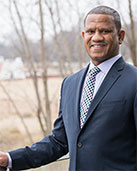
Alvin B. Tillery Jr.
Associate Professor of Political Science and African American studies; Director of the Center for the Study of Diversity and Democracy
“My warning to Americans, particularly people of color, is we are not safe,” said Alvin B. Tillery Jr., director of the Center for the Study of Diversity and Democracy at Northwestern.
Tillery is an associate professor of political science. His research and teaching interests are in the fields of American politics and political theory. His research focuses on American political development, racial and ethnic politics and media and politics.
Quote from Professor Tillery:
“We have learned several things over the past 12 months that make me fearful for our future as a diverse, prosperous democracy.
“First, the Republican Party has become more committed to ensuring that America has an authoritarian future predicated on minority-rule than it was in the hours after the damage that Mr. Trump’s supporters unleashed on the Capitol last year. The spate of electoral nullification laws passed by Republican-controlled state legislatures is the most brazenly anti-democratic threat to this country that we have seen since the Counter-Reconstruction movement between 1874 and 1876.
“Second, we have learned that there is no branch of government capable of putting down the Republican Party’s march to authoritarianism. Just like when white supremacist groups rose up to steal local, state and federal elections during the Counter-Reconstruction in the 1870s, the Democrats slow-footed, weak-kneed rhetorical and legislative responses are burning valuable time that may ultimately prove the undoing of the republic. The fact that the Democrats made a spending bill their top legislative priority of 2021 at a time when Republican members of Congress, state legislators and operatives remain engaged in an active coup attempt is just dumbfounding. The people who sacked the Capitol on January 6, 2021, and their supporters did not do so for better healthcare, roads and bridges, and a child tax-credit. They sacked the Capitol because they simply do not share the values that are ascendant in America’s increasingly diversifying democracy.
“Perhaps the most disappointing thing that we have learned is that the American people are largely content to watch their democracy burn. Two years after the largest mass protest movement in American history in the name of #BlackLivesMatter and after watching incredibly brave young people strike out for Democracy in places like Hong Kong and Nigeria, the American people are greeting the continuing assault on our democracy with a resounding: ‘meh.’
“So, on this eve of the one-year anniversary of the Capitol uprising, my warning to Americans, particularly people of color, is that we are not safe.”
Focus Areas:


